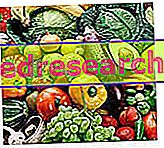Definition and regulations
The modern definition of natural foods and organic foods is indirect and presupposes:
specific production methods;
absence in the final product of foreign substances or in any way considered dangerous (artificial colors, flavorings, synthetic ingredients, GMOs etc.).
" Organic farming includes all agricultural systems that promote the production of food in a socially and economically healthy way; from an environmental point of view it drastically reduces the use of fertilizers, pesticides and synthetic chemical medicines. On the contrary, it uses strength of natural laws to increase yields and resistance to diseases "
IFOAM ( International Federation of Organic Agriculture Moviment )
Biological: illusion or reality?
We first of all emphasize the acronym IFOAM (International Federation of Organic Agriculture Movement), in which the term "BIOLOGICAL" is not used - as instead it continues to do improperly in Italy - but is replaced by "ORGANICO". In fact, we can talk about organic products, for example an organic apple, only when synthetic counterparts will be produced, for example an apple made in the laboratory.

Also in reference to the definition of organic farming, given by IFOAM, there is no lack of criticism; it is not true, for example, that in organic farming the use of fertilizers, pesticides and chemical medicines is drastically reduced. In fact, despite the fact that in the biological world such products are - at least on paper - apparently less "dangerous", they are still used in a way that is certainly not negligible.
On the other hand, today as today, a biological production system in the strict sense would not allow to feed the population (in agreement with FAO), because already 30% of potential production is lost due to parasitic causes (despite the use of pesticides). and synthetic chemical medicines).
We also recall that throughout Europe we no longer speak of organic agriculture, but of organic agriculture, and how this is regulated by a specific production disciplinary (see: REGULATION (EC) No. 834/2007).
Particular attention during the purchase of organic food in large-scale retail trade or small grocery stores, especially when they are exposed loose (as happens for vegetables and unpackaged fruits). To be recognizable, in fact, an organic food must be hermetically packaged and present a label appropriate to the law; only in this way does it respect the concept of traceability. Although the presence of the addresses of the producer and the distributor does not give absolute certainty about the biological origin of the food, it testifies at least their taking responsibility; consequently, it provides a certain guarantee to the consumer.
Ultimately, we cannot continue to describe organic foods as something immaculate, treatment-free and 100% natural; in doing so illusions and expectations are nourished, which at the very moment in which they are disregarded end up stealing credibility from the entire sector. The consumer, for his part, must understand that behind a biological product, there exists - or should exist - first of all a cultivation method centered on respect for nature, therefore with a reduced environmental impact compared to traditional techniques. Regardless of food frauds, which affect both natural and organic products (more subjects than the former due to the greater commercial value), terrorism against synthetic phytosanitary and over-reliance on organic products are therefore unfounded. The former, in fact, are present - or should be present - in minimal concentrations, often less dangerous than the natural poisons present in some foods (with the difference that many phytosanitary products are rinsed away, while the latter are not); more sensible is the use of food and biological products in the diet of sick people or newborns, because they are more susceptible to the toxicity of some substances (not only phytosanitary, but also - for example - the residues of heavy metals coming from a factory next to the place of cultivation).



